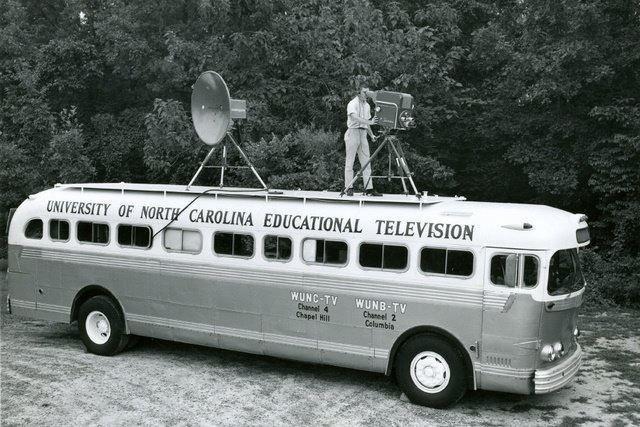
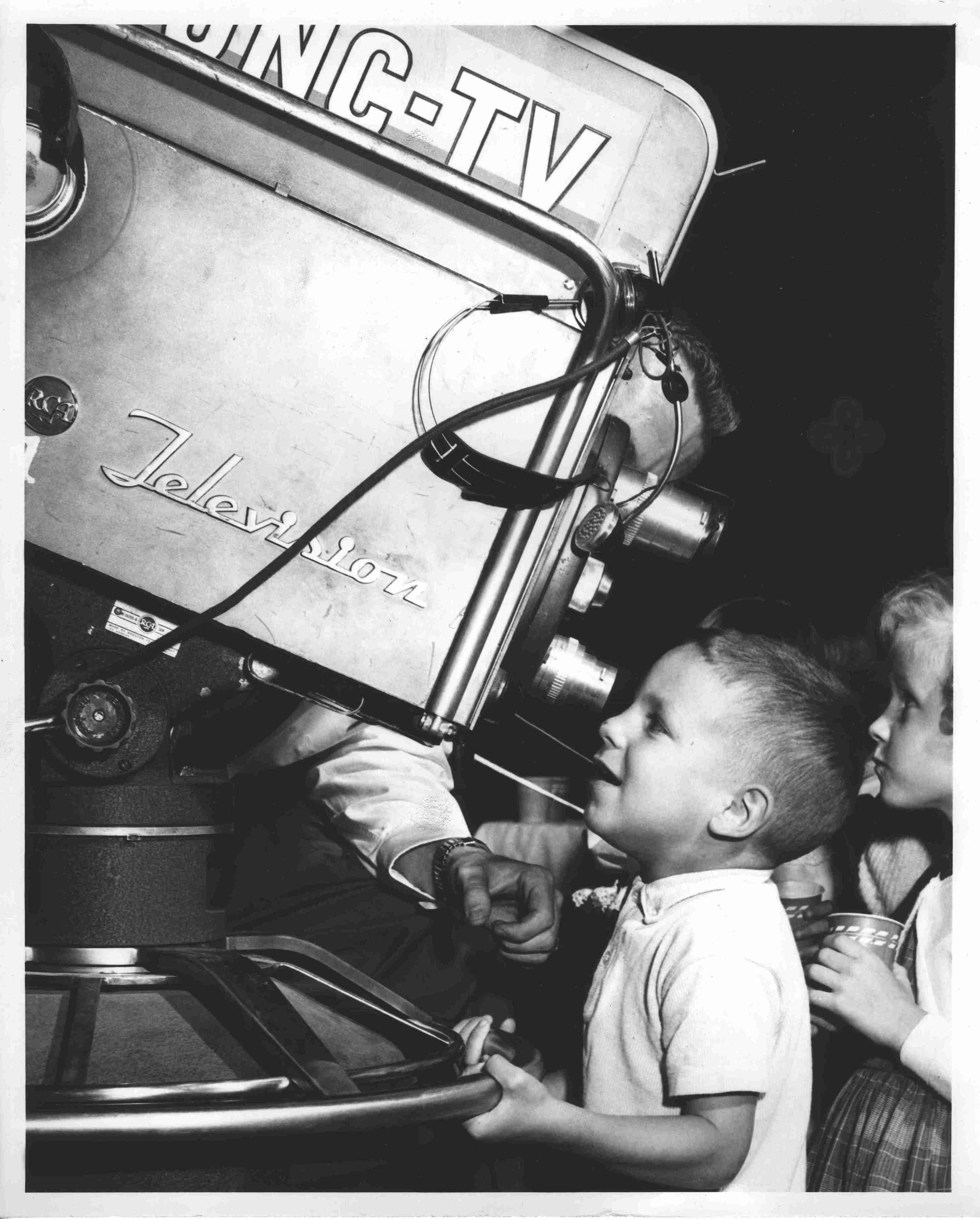
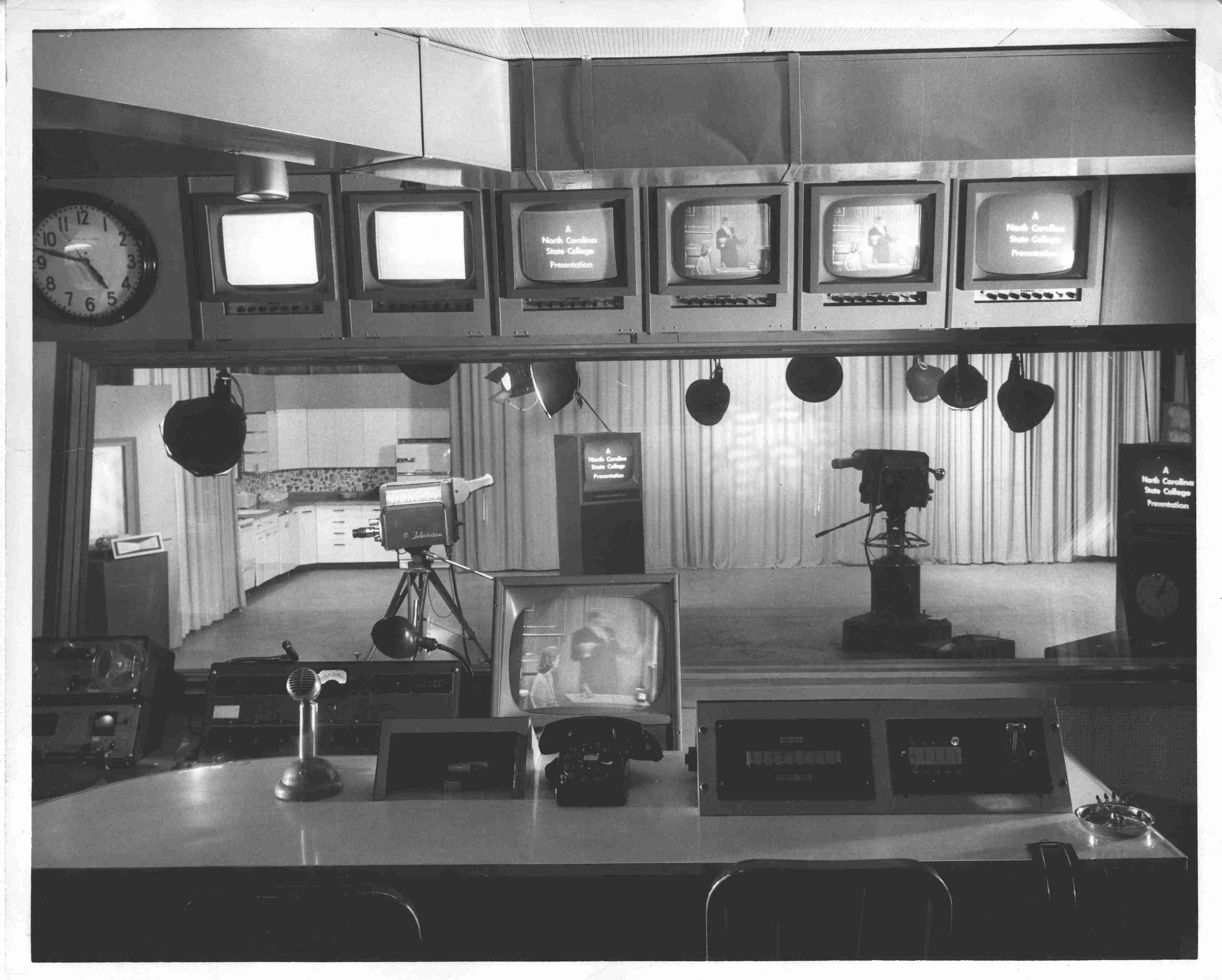
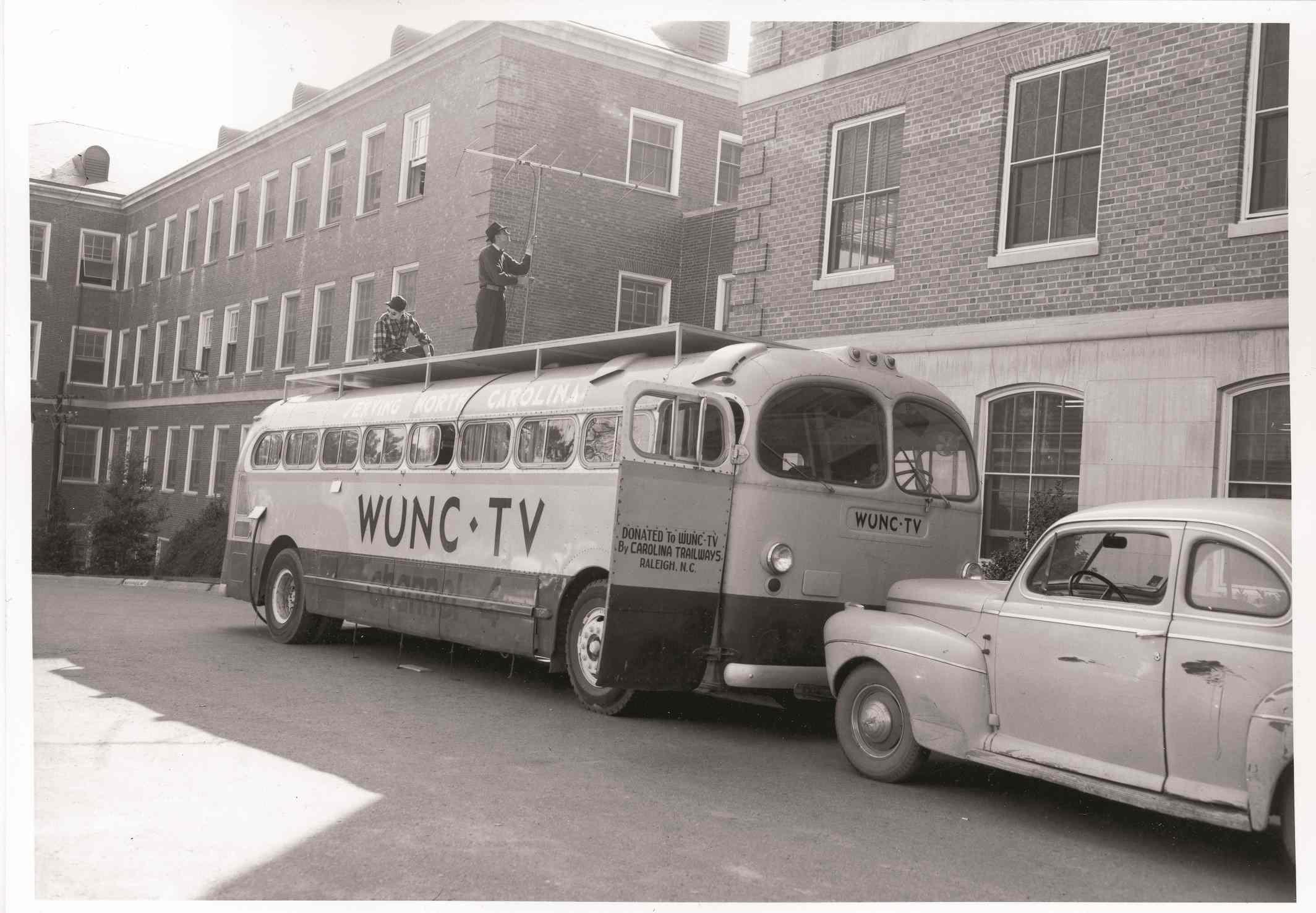
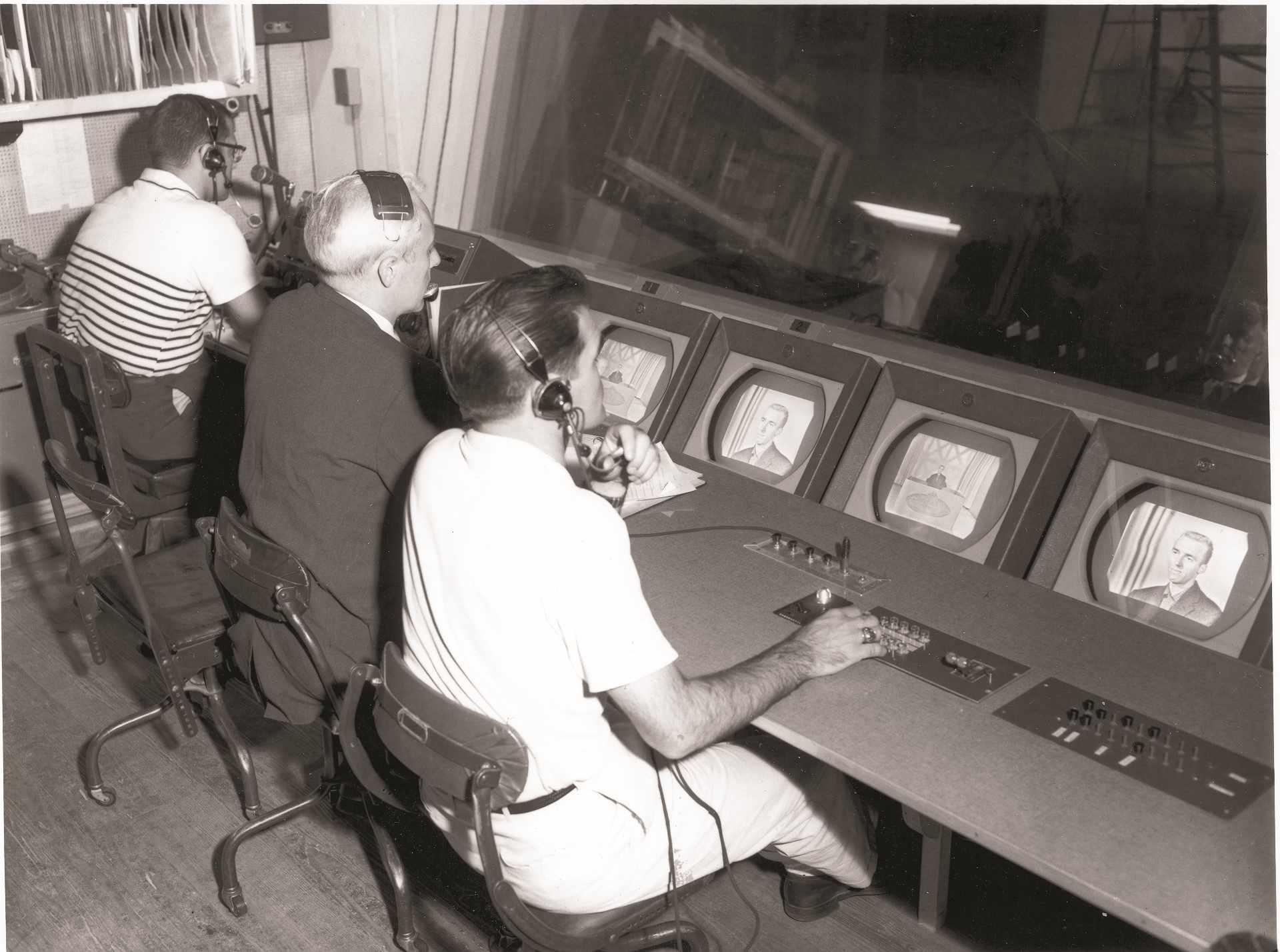
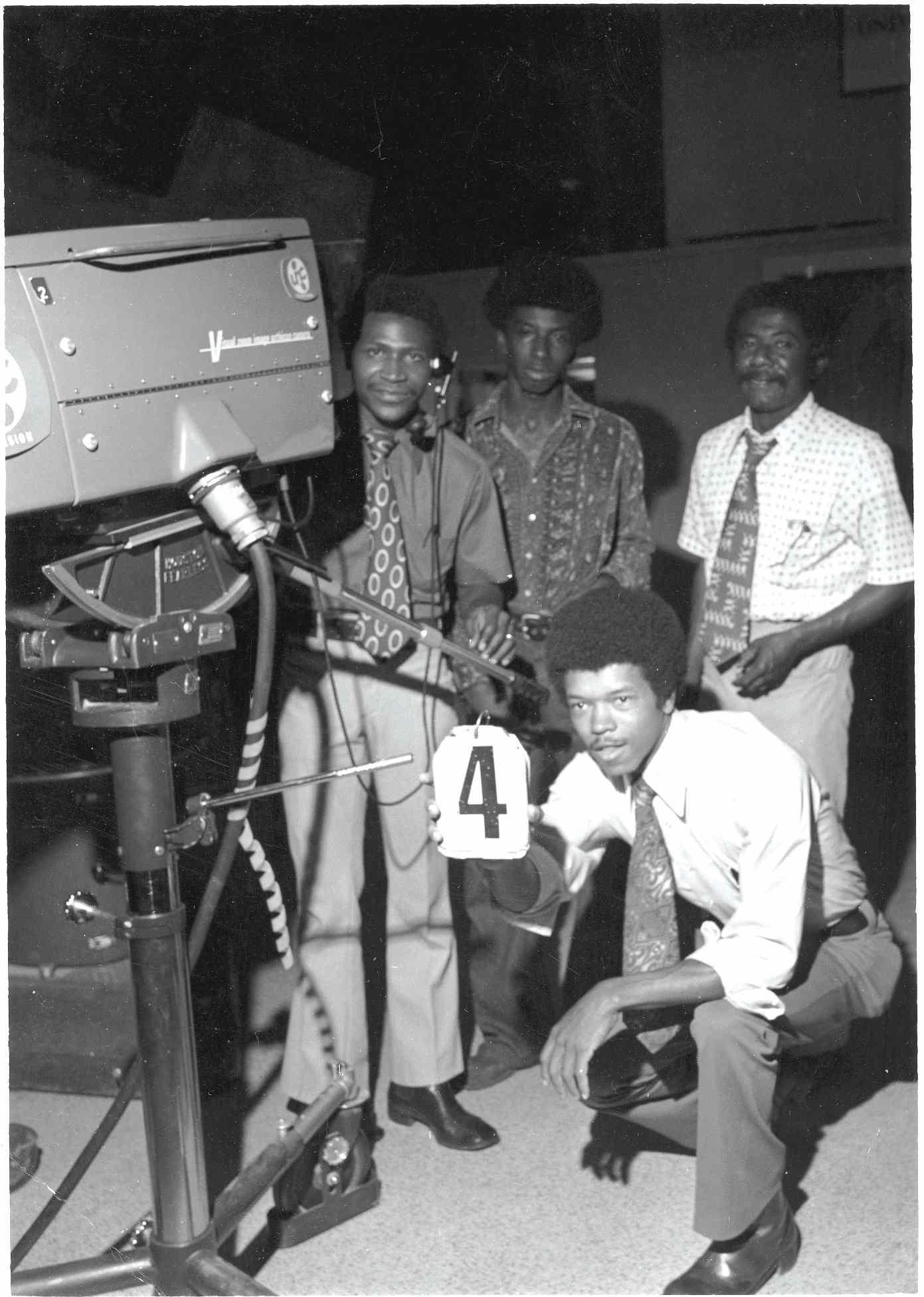
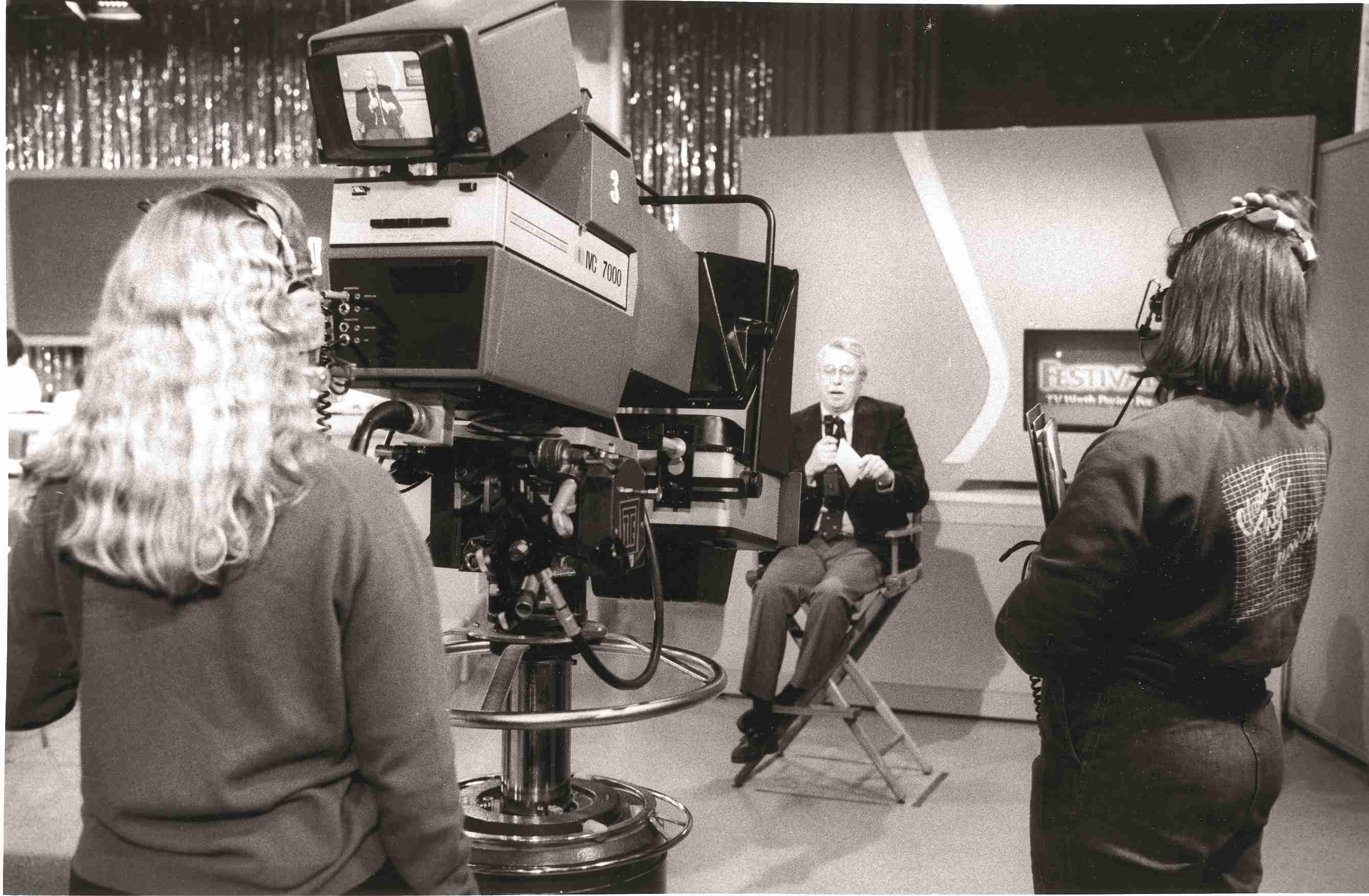
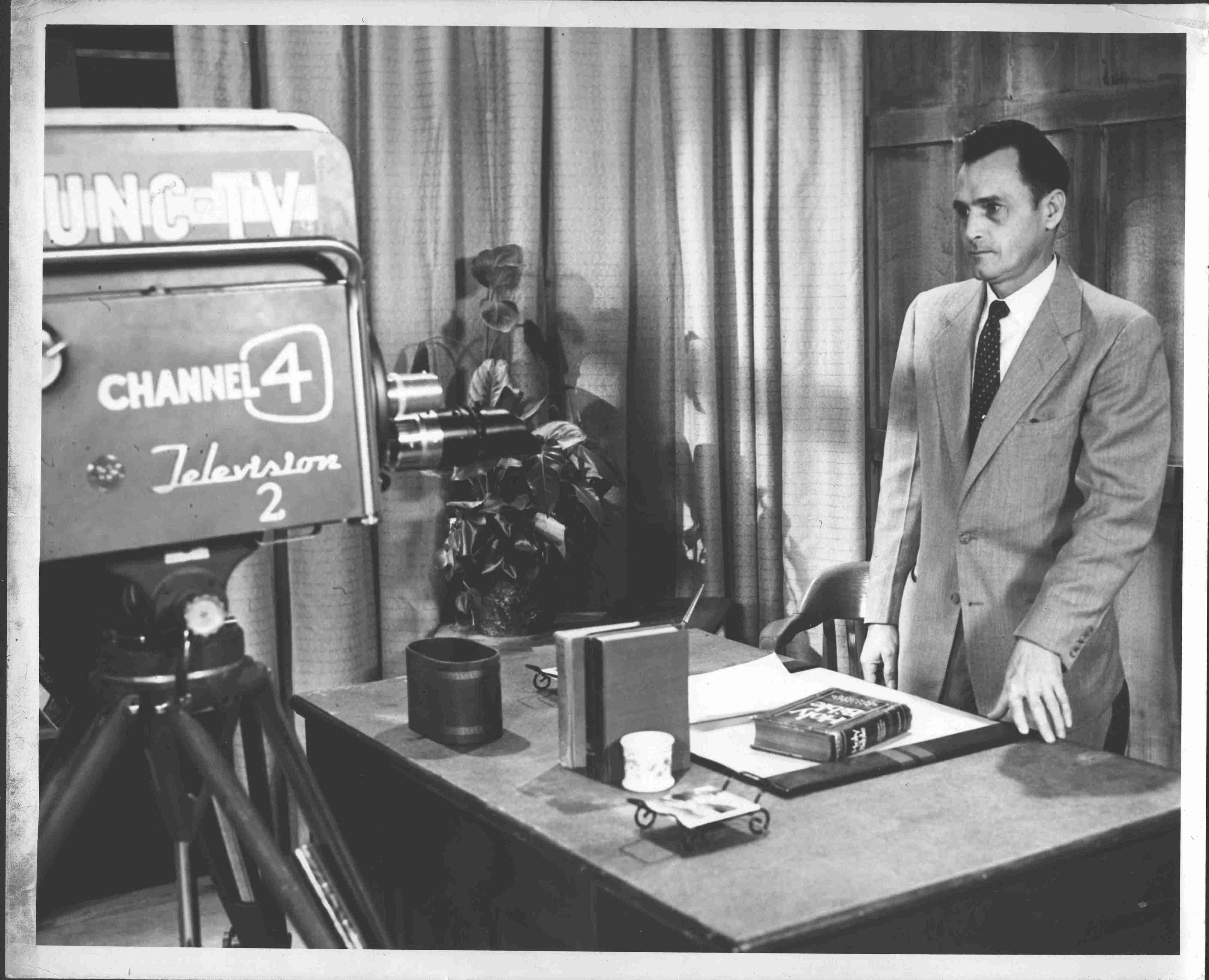
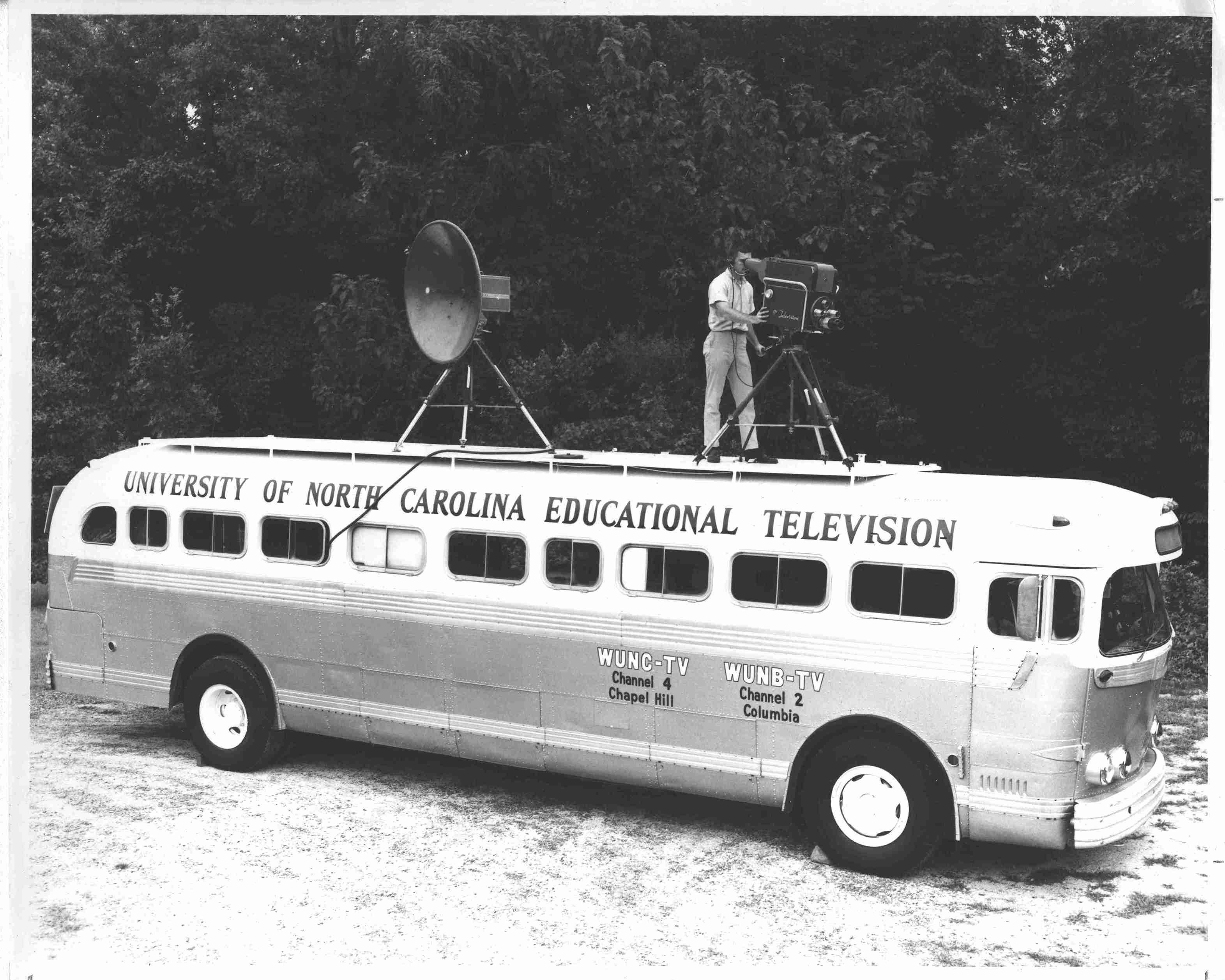
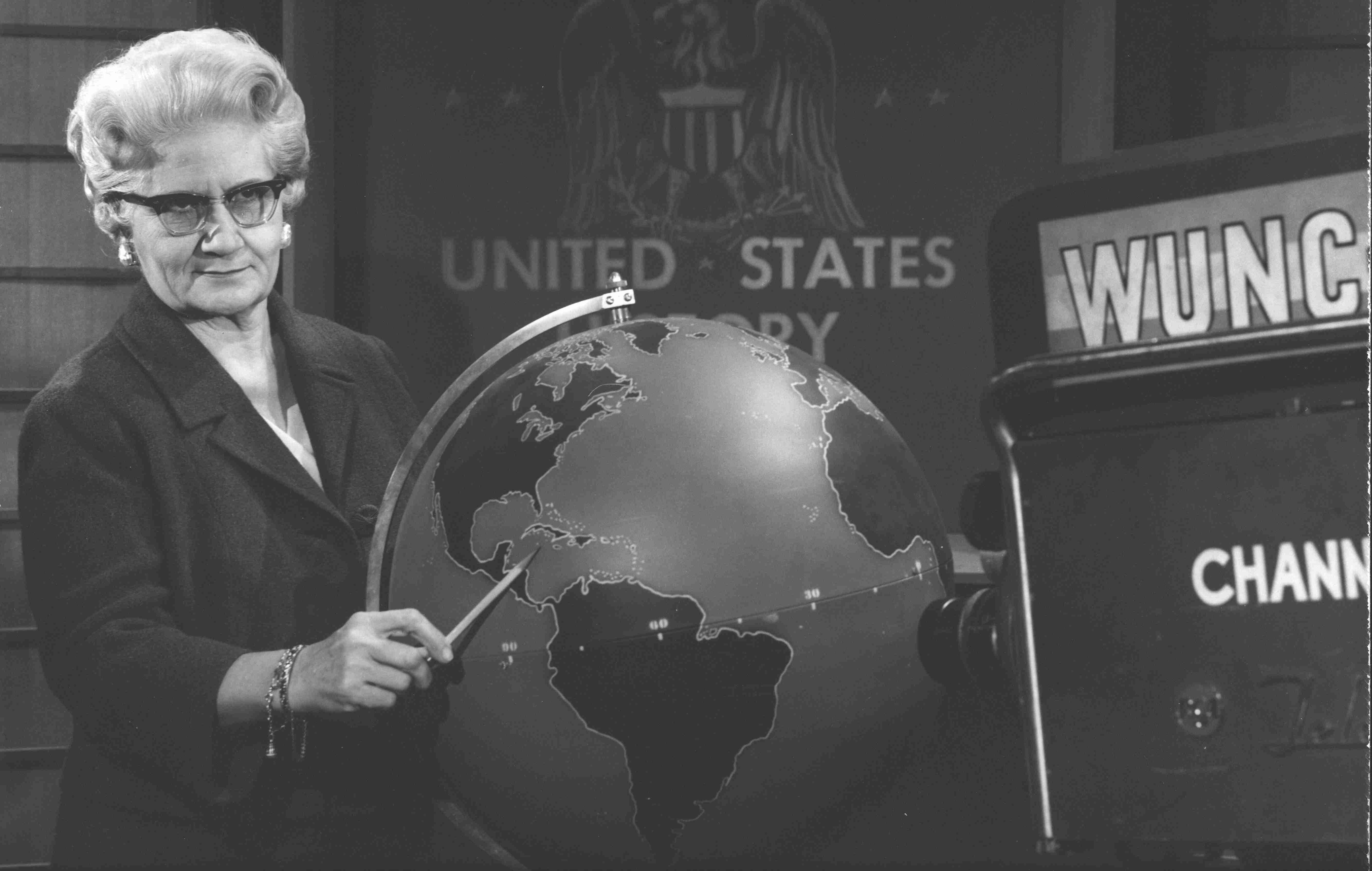
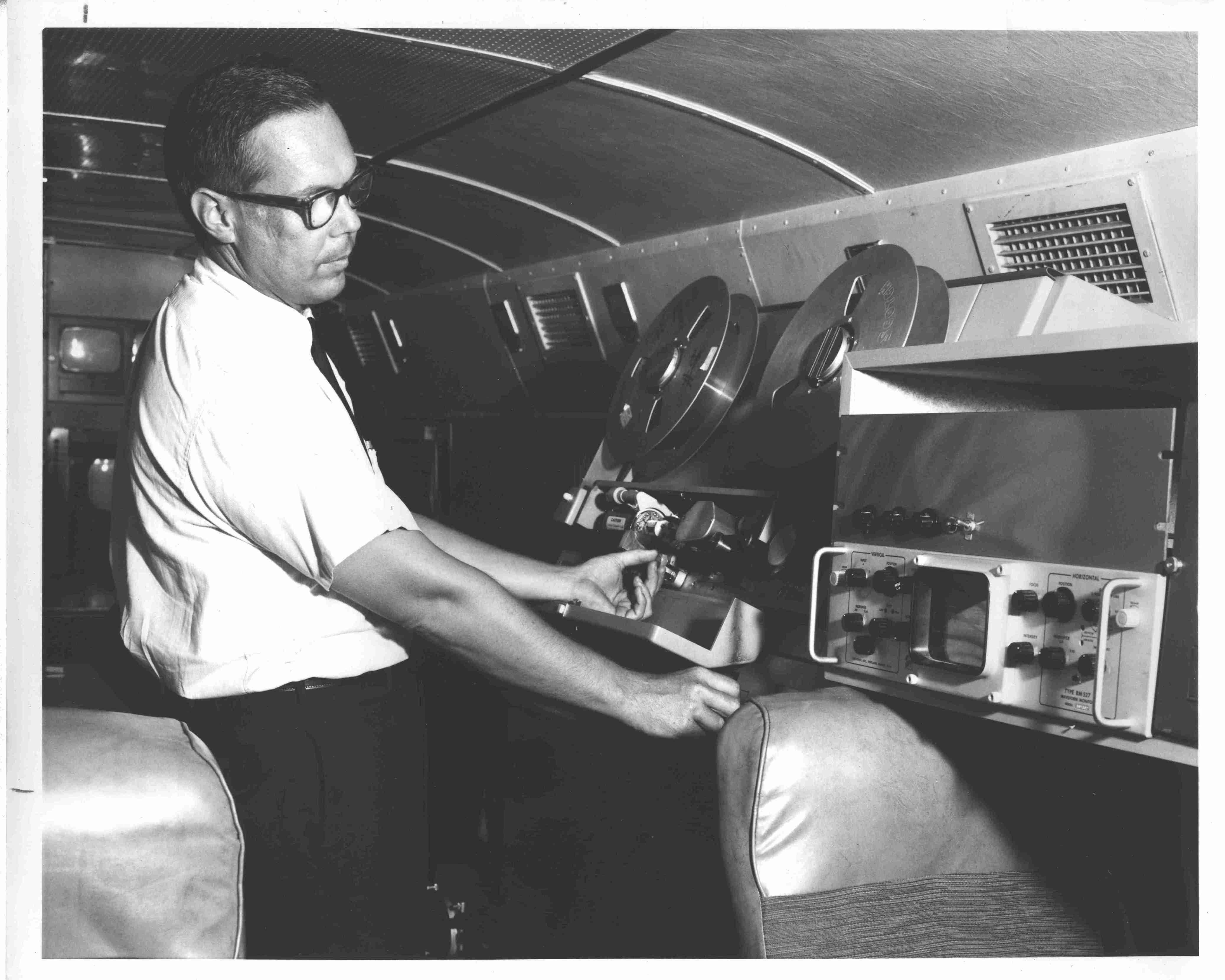
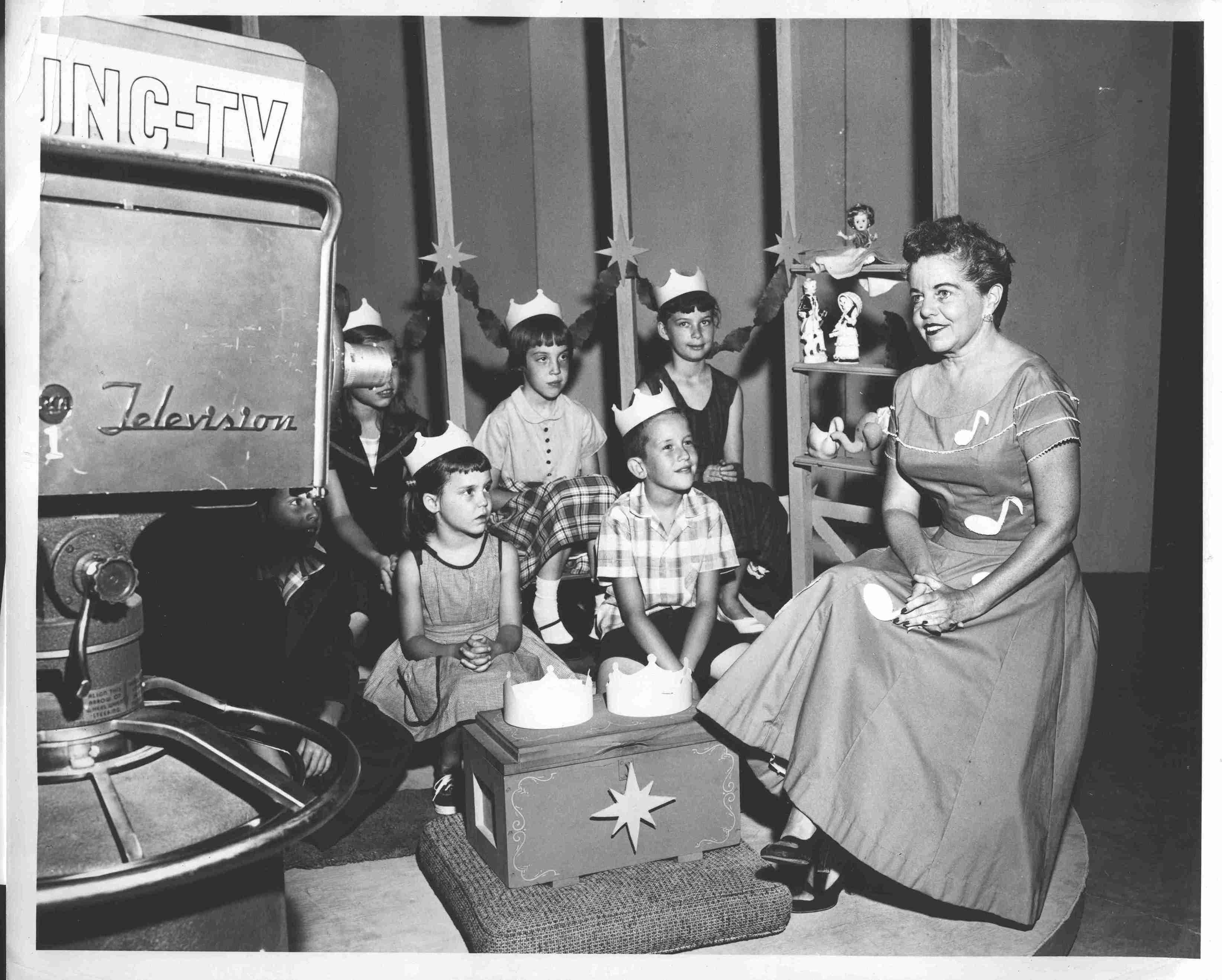
Our Evolution
Tonight someone in North Carolina will discover a world of knowledge, creativity and storytelling with just a click. That person will be watching PBS North Carolina, a multiplatform public media network that brings the best of PBS, original local programming, educational resources and more to all North Carolinians 24/7.
Humble Beginnings
When WUNC-TV Channel 4 went on the air in Chapel Hill on January 8, 1955, as the first educational station in the state and the tenth in the nation, no one could have predicted its eventual evolution into North Carolina’s only statewide public media network. The pioneers instrumental in getting WUNC-TV off the ground overcame more than a few obstacles to turn the dream of educational TV into a reality.
That first night featured a telecast of the freshman and varsity basketball games between Wake Forest University and the University of North Carolina in Chapel Hill. To get a camera into UNC’s Woollen Gymnasium, the production crew had to cut a hole in the gym’s second story.
A Vision to Bring Education to All
Three visionary leaders were behind the historic effort to make that first broadcast possible: William D. “Billy” Carmichael Jr., the university’s vice president for finance; band leader Kay Kyser, a dedicated Carolina alum; and William C. Friday, assistant to Gordon Gray, president of the consolidated three-campus University of North Carolina. They anticipated television’s potential to bring education directly to North Carolinians of all ages.
When the Federal Communications Commission offered eight channels in North Carolina for noncommercial broadcasters in 1952, the trio moved swiftly. President Gray convened a conference of deans and directors from the Raleigh, Chapel Hill and Greensboro campuses to examine the potential educational uses of television. In May 1953, the university trustees approved their idea.
Carmichael, Kyser and Friday raised $1.8 million in cash and donated services to build the station and provide some operating funds. The North Carolina General Assembly also appropriated $217,000 for the new venture, beginning its long-term support of public media in North Carolina.
Initially, the station operated in three different locations, one on each campus. The Greensboro studio was a converted laundry facility. The studio at Chapel Hill was once a dining hall. Only the Raleigh studios were specifically built for television production. All three locations fed programs to the station’s single transmitter and tower, located atop Terrells Mountain in Chatham County. A donated Carolina Trailways bus was converted into a mobile remote unit, making it possible to cover events outside the studios.
The establishment of WUNC-TV would have been impossible without the generosity of Joseph Bryan, then president of Jefferson Standard Broadcasting. Bryan intended to apply for the license for Channel 4 to extend his company’s presence into the Triangle. However, when he learned of the university’s interest in acquiring Channel 4, Bryan turned all the paperwork connected with the application over to the university, saving thousands of dollars in research, engineering and legal fees.
On May 8, 1957, William Friday, one of educational television’s biggest boosters, was inaugurated as president of the consolidated university. His efforts on behalf of UNC-TV over the ensuing decades greatly benefited public media in North Carolina and beyond. In fact, his weekly one-on-one interview program, North Carolina People with William Friday, was the station’s longest running show, only ending after his death in 2012.
After 10 years operating the original station, President Friday, other university officials and the North Carolina General Assembly began to plan for a network that could take the benefits of educational television to all 100 counties. By 1962, four more stations were planned with transmitters in Columbia, Linville, Asheville and Concord. Once those transmitters were completed, UNC-TV reached more than 60% of the state.
The Birth of PBS
1967 saw the release of the Carnegie Commission on Educational Television’s famous report on public broadcasting—Public Television: A Program for Action—an important milestone for public television stations all over the country. Not only was it the first time educational stations were referred to as “public television,” it also established the Corporation for Public Broadcasting (CPB) to encourage and foster development of public broadcasting and receive federal funding. CPB, in turn, set up the Public Broadcasting Service (PBS) to manage the national distribution of programs.
Mister Rogers’ Neighborhood made its debut in 1968. Sesame Street began its long run one year later. Programs such as Masterpiece Theatre, Nova and Washington Week (originally called Washington Week in Review) went on the air, showing the potential of public television to enlighten and entertain as well as educate.
In 1969, the Office of Director of Educational Television was established within the university, ending a period of independent operations at the separate locations. The first person to hold this post was Dr. George Bair. During his tenure, three more stations were added to the network: Wilmington in 1971, Greenville in 1972 and Winston-Salem in 1973.
In 1979, the University of North Carolina Center for Public Television was established by the UNC Board of Governors, the first step toward combining the growing network’s studio operations and administrative headquarters at a single location. A 22-member Board of Trustees was appointed to serve in an advisory capacity representing the public. John W. “Jake” Dunlop, former head of Vermont Public Television, became the new director in 1980. The network’s reach continued to increase with the establishment of stations in Jacksonville in 1982 and Roanoke Rapids in 1985.
Becoming a Major Resource for the State
A highlight in the network’s history occurred in 1989 with the opening of the Joseph and Kathleen Bryan Communications Center in Research Triangle Park (RTP). Within its gleaming white tile walls, the university finally centralized the network’s studio operations in a single location. Again, old friend Joseph Bryan helped out with a $1 million gift to encourage the General Assembly to come up with the needed money for the $8.3 million facility.
The move to RTP signaled a transition into the modern era of broadcasting. The North Carolina Association of Broadcasters acknowledged the significance of this step forward when it elected Jake Dunlop to its Hall of Fame in 2000.
From humble beginnings, UNC-TV transformed into a major media presence in North Carolina, serving one of the largest audiences in all of public television. The educational station with a single transmitter had grown into a major state resource ready to be taken to the next level.
A New Focus on Original Programs
In 1986, C.D. Spangler, Jr., who succeeded William Friday as president of the now 16-campus University of North Carolina, hired Wyndham Robertson, a former editor of Fortune magazine, to oversee university communications, including UNC-TV. She promptly dedicated herself to improving UNC-TV’s programs.
When station director Jake Dunlop retired, Robertson’s highest priority was hiring a new director with a commitment to programming excellence. Spangler and Robertson agreed it was time to refine the vision for UNC-TV with a greater focus on producing original programs that would better serve the needs and interests of North Carolinians. They hired Tom Howe, who had experience as a station manager, production executive, programmer, producer and director, as UNC-TV’s director and general manager in 1992. With the university’s support, he worked to improve and expand original programming and local services.
The Move to Digital
When Molly Corbett Broad took the helm as university president in 1997, she was as enthusiastic about the potential of UNC-TV as her predecessors. Soon after she took office, UNC-TV confronted its greatest challenge when the FCC issued its Report and Order requiring all television broadcasters to convert to digital technology. As a statewide network with 11 transmitters, UNC-TV faced a daunting $65 million price tag to make the mandatory change.
Because of her firm belief in the potential of digital television to serve all North Carolinians, President Broad, with the endorsement of the UNC Board of Governors and the leadership of the General Assembly, included funding for UNC-TV’s digital conversion in the Higher Education Improvement Bond, a referendum on the statewide election ballot in 2000.
This bold proposal, totaling $3.1 billion, made it the largest bond issue in the history of American higher education. The referendum passed with the support of 73% of the electorate, and UNC-TV completed its digital conversion. On June 12, 2009, UNC-TV’s stations ceased broadcasting in analog and transitioned fully to digital transmission.
Industry Accolades
The value and impact of UNC-TV’s efforts did not go unnoticed. UNC-TV won recognition from CPB, PBS, regional networks and statewide organizations for its production, promotion, outreach and development activities.
UNC-TV’s accomplishments may best be recognized through three honors bestowed on Director/GM Tom Howe: the 2003 Distinguished Service Award from the North Carolina Association of Broadcasters, the Lifetime Achievement Award from the Board of Governors of the Nashville/Midsouth Chapter of the National Academy of Television Arts and Sciences and election to North Carolina Association of Broadcasters’ Hall of Fame. These prestigious industry recognitions are reflections of the excellent work of every individual connected with the station.
When Howe retired in 2014, longtime Associate General Manager Gail Zimmermann was named interim director. As a national search identified potential candidates for director, Zimmermann kept the network stable while presiding over changes within the industry and the organization. With her retirement in 2016, Brian Sickora, former president and CEO of WSKG Public Media in Binghamton, New York, became UNC-TV’s executive director and general manager. Sickora stepped down in late 2018 to explore new opportunities in the private sector. Following an exhaustive national search, Lindsay Bierman, then the chancellor of the University of North Carolina School of the Arts, was named as the network’s chief executive officer and started his tenure as CEO role in August 2019.
COVID Brings Unprecedented Challenges
In 2020, COVID-19 forced the organization to reimagine how to provide local productions, engagements and education in pursuit of its mission. When the pandemic hit, UNC-TV combined its existing education initiatives with new learning opportunities under the At-Home Learning umbrella. This effort was purposefully designed to complement what kids were learning in the classroom and behind their screens. Although the network could not replace the experience and skill of teachers, digital resources like Teacher Time and Classroom Connection helped close the gaps in educational opportunity and mitigate the interruptions that COVID forced on students and families.
In addition to bolstering its remote learning offerings, UNC-TV was on the front line delivering essential briefings. It partnered with the NC Association of Broadcasters on public safety communications efforts and distributed vital emergency information accessible across media platforms in both English and Spanish. UNC-TV broadcasted and livestreamed all State Emergency Operations Center emergency announcements and was the only media organization allowed in the Center during the pandemic. Our livestreams and emergency briefings received a combined 2.3 million views across our multiple online distribution platforms.
Introducing PBS North Carolina
On January 12, 2021, UNC-TV Public Media North Carolina rebranded as PBS North Carolina, Powered by the UNC System. The change represents the innovative multimedia platform it has become, encompassing its statewide broadcast reach to North Carolina’s 100 counties and the many ways it serves communities across platforms and through in-person engagement.
PBS North Carolina harnesses the energy of the UNC System to inform communities in times of crisis, engage with complex local and national issues, offer opportunities to learn and raise the level of discourse for all North Carolinians.
The rebrand made it easier for North Carolinians to find their favorite shows and educational resources, including locally produced content, across broadcast, online, streaming and apps. The main broadcast channel, UNC-TV PBS & More changed to PBS NC. The other existing channels—the North Carolina Channel, the Explorer Channel and Rootle 24/7 PBS KIDS—remained the same.
Bridging the Digital Divide
PBS North Carolina is a leader within the Public Broadcasting System on the development and implementation of the new broadcast television technology ATSC 3.0/NEXT GEN TV. This technology offers viewers a better experience with improved picture quality, immersive audio, the potential for interactivity when connected to a smart TV and better reception.
PBS North Carolina is widely recognized for its innovative efforts to utilize NEXT GEN TV to provide private communications to first responders embedded in the television broadcast signal. We continue to work with partners to explore this technology and its potential to save lives. PBS North Carolina is also innovating in remote-learning technologies over NEXT GEN TV to extend internet-like access to students in non-connected homes.
New Leadership for a New Era
In September 2022, veteran journalist David Crabtree was named the CEO and general manager of PBS North Carolina, replacing Lindsay Bierman, who served through March 2022. Crabtree is well-known in North Carolina following a distinguished career as a broadcast journalist at WRAL. An anchor and reporter with three decades in the television news industry, he has received numerous awards, including 16 Emmy Awards, an Edward R. Murrow Regional Award and the duPont and Gabriel awards. He was named Reporter of the Year four times from the Radio Television News Directors Association and won the North Carolina Association of Broadcasters’ Distinguished Service Award.
Since joining the organization, Crabtree has prioritized supporting the staff as they deliver a robust portfolio of content, engagement and education initiatives to the state as well as connecting with board members and partners. He and his team continue to navigate the rapidly changing media landscape with investments in multiplatform content distribution, including the launches of a redesigned website and a new AR app geared toward young learners.
Under David Crabtree’s leadership, new programs like the weekly legislative series State Lines and the six-part series The NC Listening Project (hosted by Crabtree) were launched and connected with audiences across the state. In May 2023, PBS North Carolina hosted nearly 3,500 attendees for a taping of Antiques Roadshow at the North Carolina Museum of Art in Raleigh and created an accompanying behind-the-scenes special, hosted by David Crabtree and NC Weekend’s Deborah Holt Noel. The three episodes filmed that day aired April 2024 as part of Antiques Roadshow’s 28th season.
In November 2024, the PBS North Carolina documentary American Coup: Wilmington 1898, a coproduction with American Experience and 371 Productions, premiered nationwide on PBS member stations across the country. The film tells the little-known story of a deadly race massacre and carefully orchestrated insurrection in North Carolina’s largest city in 1898—the only successful coup d’état in the history of the U.S. The story of these harrowing events was suppressed for several decades until scholars as well as descendants of the perpetrators and victims began to investigate. The film is accompanied by robust education resources and engagement events.
PBS North Carolina’s Division of Education and Innovation continued to uphold its mission to serve all families and educators across the state through its ongoing work with the Rootle Roadster Tour, the Rootle Ambassador Program, the annual Impact Early Childhood Education Summit and the launch of the PBS KIDS musical podcast Jamming on the Job.
In December 2024, Laura Kieler was named the deputy general manager of PBS North Carolina, where she plays a key role in organizational strategic planning, community engagement and development efforts, including supporting funding initiatives and the planning of PBS North Carolina’s future broadcast center. Kieler works closely with PBS North Carolina’s education team to expand programming that addresses the learning needs of communities across the state.
Celebrating 70 Years
On January 8, 2025, PBS North Carolina marked a special milestone by celebrating 70 years. Since it first went on the air on January 8, 1955, PBS North Carolina has grown and evolved to meet the needs of all North Carolinians through its dynamic storytelling, valuable educational resources, engaging community events and powerful emergency management partnerships. None of this is possible without the support of our members and donors. Together, we’ll continue to serve and empower our state’s vibrant communities with content, resources and services that uplift and inspire.